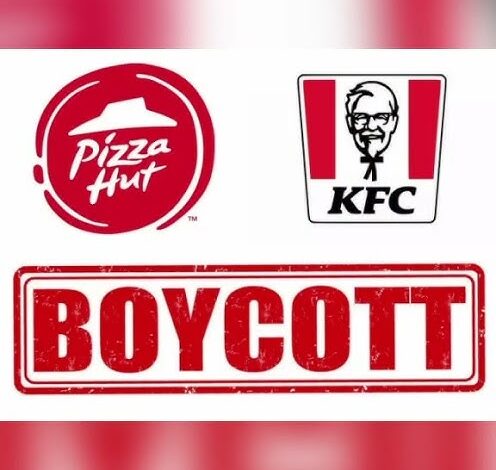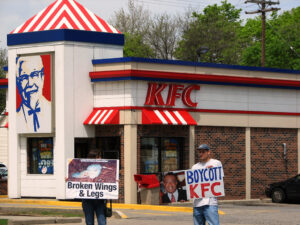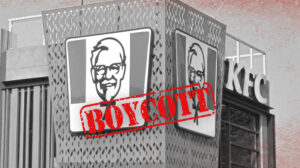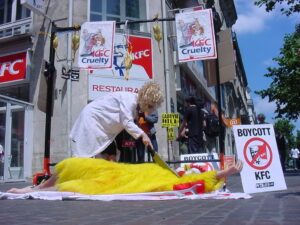Top Reasons Why You Should Boycott KFC Today

KFC, a global fast-food giant known for its iconic fried chicken, has been facing scrutiny in recent years over its operations in Palestine. The controversy stems from KFC’s presence in Israeli settlements located in occupied Palestinian territories, where the company operates franchises. This has led to calls for a boycott of KFC products as a form of protest against the occupation and in solidarity with the Palestinian people.
The issue is complex, intertwining geopolitics, human rights concerns, and ethical considerations. Supporters of the boycott argue that by continuing to operate in these settlements, KFC is indirectly supporting and legitimizing the occupation of Palestinian land. On the other hand, some critics argue that boycotting KFC may not have a significant impact on addressing the larger geopolitical issues at play, raising questions about the effectiveness of such consumer-driven activism.
As consumers become increasingly conscious of corporate responsibility and ethical practices, the debate surrounding KFC’s presence in Palestine highlights broader conversations about accountability and complicity. The intersection of business interests with political conflicts underscores the need for individuals to critically assess their consumption choices and consider how they align with their values and principles. By delving into this nuanced issue surrounding KFC and Palestine, we are confronted with important questions about corporate accountability amidst global conflicts.
Conflict in Palestine and KFC’s presence

The conflict in Palestine is deeply rooted in complex historical, political, and social factors. The presence of multinational corporations like KFC in the region adds another layer to the already volatile situation. While fast-food chains may seem unrelated to political tensions, their business operations can impact local communities and economies.
KFC’s presence in Palestine raises questions about corporate responsibility and ethical considerations. As global giants enter into regions with fragile peace, their actions can either exacerbate existing conflicts or contribute to sustainable development and peace-building efforts. Understanding the role of businesses like KFC in conflict zones is essential for consumers to make informed choices and support initiatives that promote peace and stability.
Reasons to Boycott KFC
When it comes to boycotting products due to human rights violations, the moral imperative cannot be understated. The violation of human rights should never be tolerated, and consumers have a powerful voice in holding corporations accountable for their unethical practices. By choosing to boycott products from companies that are complicit in these violations, individuals can send a strong message that such behavior will not be supported or overlooked.
In the case of KFC products and their involvement in Palestine, the need for action is glaringly apparent. Supporting businesses that profit off of oppression and injustice only serves to perpetuate these harmful actions. By abstaining from purchasing KFC products, consumers can actively participate in promoting justice and standing against human rights abuses. This boycott is an opportunity for people to align their values with their purchasing decisions and contribute to positive change on a global scale.
Impact of Boycott KFC

The decision to boycott KFC products in response to the situation in Palestine is likely to have significant economic consequences for the fast-food chain. As a popular global brand, KFC relies heavily on consumer loyalty and market presence to drive its sales and profit margins. A targeted boycott could lead to a decrease in revenue as disgruntled customers choose alternative dining options or opt to support businesses that align with their values.
A sustained boycott could tarnish KFC’s reputation and brand image, impacting its long-term success and growth potential. The negative publicity surrounding the boycott may dissuade new customers from trying KFC products, further exacerbating the economic impact. Moreover, as consumers become more socially conscious and aware of corporate behavior, companies like KFC will need to navigate these complex issues carefully to maintain their financial stability and competitive advantage in the market.
Supporting local businesses and charities
When faced with the decision to boycott large corporations like KFC in support of pressing social issues, one powerful alternative emerges: embracing and supporting local businesses and charities. By shifting our consumer choices, we can actively contribute to the growth and sustainability of small, community-based enterprises that often align more closely with our values. These establishments not only provide unique products and services but also serve as pillars of support for the local economy.
In addition to boosting local businesses, exploring partnerships with charities can have a meaningful impact on addressing critical societal needs. By donating time, resources, or funds to non-profit organizations dedicated to advocating for justice and equality, individuals can play a significant role in effecting change at the grassroots level. These collaborations pave the way for long-term investment in causes that hold deep value and significance within our communities, fostering a sense of unity and purpose among stakeholders committed to driving positive social change.
Encouraging readers to join the boycott
Are you tired of supporting companies that prioritize profit over ethics? Join the movement and boycott KFC today! By taking a stand against their unethical practices, you can send a powerful message to corporations that exploitation will not be tolerated. Your decision to boycott can make a real difference in holding KFC accountable for its actions.
Joining the boycott is not just about avoiding a particular store; it’s about standing up for what’s right and demanding better from businesses. By choosing to withhold your support from KFC, you are contributing to a larger movement that aims to create positive change in the world. Every voice matters, and together, we can make a meaningful impact on corporate behavior.
Summary of reasons to boycott KFC

Boycotting KFC is a powerful way to take a stand against animal cruelty and unethical farming practices. By choosing to no longer support KFC, you are sending a clear message that the mistreatment of animals for profit is unacceptable in today’s society. Additionally, supporting ethical and sustainable food sources can encourage other fast-food chains to adopt more humane practices.
Boycott KFC can have a positive impact on the environment by reducing the demand for factory-farmed meat and the environmental degradation associated with it. Choosing to opt out of supporting KFC means taking a step towards promoting a more sustainable food system that prioritizes animal welfare and environmental conservation. Joining the movement to boycott KFC not only benefits your own health but also contributes towards building a more compassionate and environmentally conscious food industry for future generations.



